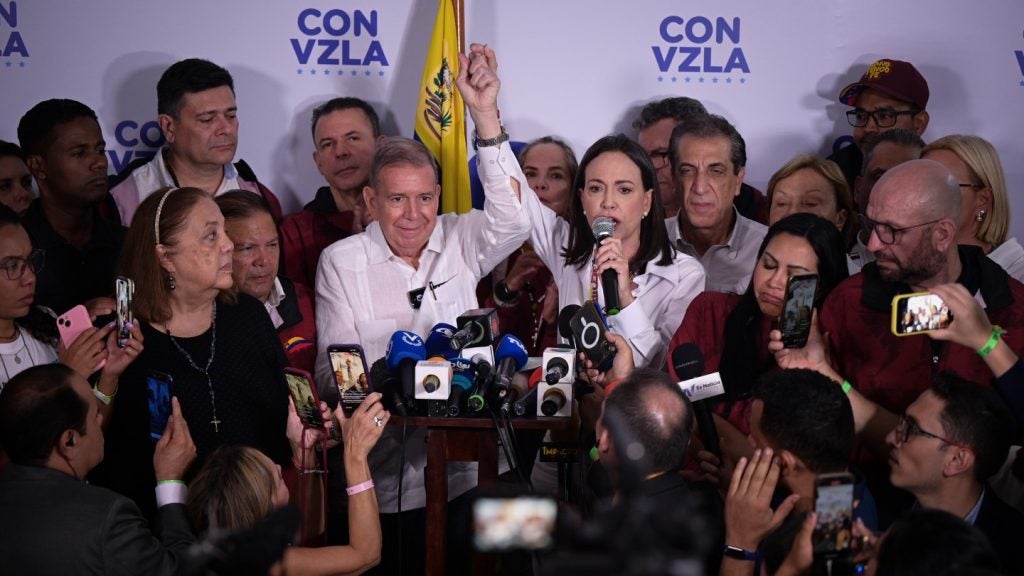Venezuela’s President Nicolás Maduro has mobilised specialist military counterintelligence units to Caracas, in a bid to keep hold of power as international condemnation rains in on his ‘fraudulent’ election victory.
Over the past couple of days, footage has emerged of a large deployment of armed trucks, vehicles and personnel in the streets of Caracas. These appear to be part of the DAE, a Special Affairs Unit within the General Directorate of Military Counterintelligence (DCGIM).
The DAE is a name that sends shudders down spines across Venezuela. Headed by Major Alexander Enrique ‘Granko’ Arteaga, it specialises in ‘counterintelligence operations’, according to its archived website.
Granko reached international infamy, however, when the US sanctioned four DCGIM members in 2019 following the death of Venezuelan Navy Captain Rafael Acosta in their custody.
The UN has also investigated the DCGIM’s “extrajudicial executions, enforced disappearances, arbitrary detention, torture and other cruel, inhuman or degrading treatment, including those involving sexual and gender-based violence.”
Maduro’s ‘coup-proofing’
Deployment of military intelligence services is in keeping with Maduro’s authoritarian Venezuela, where the “military is designed for domestic use ahead of external deployment”, according to Wilson Jones, defence analyst at GlobalData.
“‘Coup-proofing’ is a common example. Maduro (and Assad, Kim, Saddam, or any dictator) is more concerned about staying in control of rival factions than defending a foreign threat,” Jones tells Army Technology. “The DCGIM seems to fill that role. Any group with counterintelligence responsibilities is generally going to have access to more intel, be treated as an elite unit with better equipment, and receive more regime privileges.”
Since protests broke out on Monday (29 July), at least 11 people have been killed, according to human rights NGO Foro Penal. There have been 711 arrests, reported by local outlet El Nacional.
A heightened step-up in military presence has coincided with a crackdown on Venezuela’s opposition, which claims González won 67% of the vote.
In an op-ed for the Wall Street Journal, María Corina Machado – the driving force behind the alliance despite being banned from standing – called the election a “fraudulent result”. She also said “dozens” of her colleagues had been arrested and six of her top aides had taken refuge in the Argentinian embassy in Caracas.
Earlier today (2 August), the headquarters of Venezuela’s opposition parties was ransacked by half a dozen masked assailants, who reportedly kicked down doors and stole valuable documents.
This follows video footage from Tuesday (30 July) which shows key opposition figure Freddy Superlano being kidnapped by masked men in Caracas.
Superlano is national political coordinator for the ‘Voluntad Popular’, a centrist party which has joined the ‘Plataforma Unitaria’ opposition alliance headed by González and powered by Machado.
The ‘colectivos’ – government gangs with “plausible deniability”
Who exactly kidnapped Superlano remains unclear, but some have pointed to the ‘colectivos’.
These groups of government-armed gangs have threatened Venezuelan voters and turned up to anti-Maduro protests with weapons as an intimidation tactic.
The colectivos do, however, demonstrate that the “general state of the Venezuelan military is not good”, Jones adds.
“Any country in such a severe economic crisis just cannot keep forces trained and armed well,” says Jones. “Maduro’s administration is also relying on paramilitary motorcycle gangs, or colectivos, in Caracas and other cities to maintain power.”
Comparisons have been drawn between Maduro’s colectivos and the ‘titushky’ – government agents who posed as hooligans to “beat up protestors with plausible deniability”, in Jones’ words, used by Russia and other post-Soviet states.
Washington deliberated in responding to Maduro’s actions until Secretary of State Antony Blinken today (2 August) said main opposition candidate Edmundo González had won.
Alongside counterparts in Colombia and Mexico, Brazilian President Lula – a former Maduro ally – called for the release of the complete electoral dataset.
Attempts by the EU to make a unified statement were blocked by Hungary, itself governed by authoritarian-leaning Prime Minister Viktor Orbán. China and Russia were among nations to congratulate Maduro.
Despite its oil wealth, almost eight million people have fled Venezuela due to the economic chaos of Maduro’s presidency over the last 11 years.
All eyes now turn to the large-scale protest Machado and González plan to lead in Caracas tomorrow (3 August). Would Maduro and Granko risk international arrest warrants by deploying specialist DAE agents to arrest the two opposition leaders?









